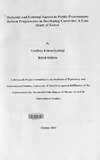| dc.description.abstract | Two audits conducted on public procurement in Kenya by SGS ( in 1987) and the World Bank in collaboration with the Kenya Government( in 1997) revealed that despite the fact that over 60% of government revenue is spent on public procurement, there existed a wide scale corruption and inefficiency. From this was generated the need to reform this sector whose effects had incrementally stifled domestic investment, with many adverse effects on the economy. The study examines the progress of procurement reform process from its commencement to date and, seeks to assess the various interventions employed by the government to fix various problems in the sector.
The study seeks to establish whether Kenya's public procurement reforms are donor-driven, and whether they are protectionist in nature. Adopting the historical and analytical approaches, the study chronicles the various efforts at reforming public procurement system. Spanning from a discussion of the historical perspective, to the challenge of donor-driven reforms, and a review of the Public Procurement and Disposal Act, 2005, the study takes stock of comparative procurement reforms in selected Third World countries namely, Ghana, Indonesia and the Philippines.
The study arrives at the findings that public procurement reform in Kenya is not wholly donor-driven, but is also a response to the gaps that existed prior to the enactment of Public Procurement and Disposal Act, 2005. While contributions by the business community, civil society and the Government towards procurement reforms process are appreciable, it is the pressure that the donors brought to bear that kick-started the reform process, and sustained the tempo, which culminated in the enactment of the Act. The reforms are not protectionist.
Finally, the study recommends mandatory and continuous training on procurement law and policy at the professional level, and entrenchment of procurement discipline in the syllabi of the universities and other institutions of higher learning. It also proposes development of a cadre of reformers and incorporation of the media to spearhead the creation of a sound procurement system. It posits that the reform agenda can only be sustained on a foundation of steady political goodwill. | en_US |

